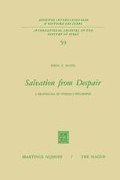Abstract
The ultimate concern of Spinoza’s philosophy, as we have seen, is not simply a theoretical interest in ethics but a deep practical desire to discover the best way to live. Spinoza was no mere theorist; he put his philosophy into practice and lived the kind of life he found on theoretical grounds to be the most satisfactory. And he did so only when and because he was rationally convinced. Though experience taught him that the pursuit of mundane advantages was frustrating and unsatisfying, he was not content to accept experience as the final arbiter of the truth and to rest his convictions upon it. That experience was real and bitter. The Synagogue, in which his learning and great intellectual powers might have qualified him for distinction, rejected him with the most awesome curses and expelled him from the Jewish community. His own sister attempted to exclude him from his heritage, so that he had to resort to the law to establish his rights (which he then voluntarily relinquished). In trade he found men all too ready to swindle and defraud; and, if Lucas’ report is to be trusted, an attempt was made upon his life for no stronger reason than that his opinions and neglect of religious observance displeased the Jewish authorities. With reason he was able to write that experience had taught him that all things usually encountered in common life were futile and vain.
Access this chapter
Tax calculation will be finalised at checkout
Purchases are for personal use only
Preview
Unable to display preview. Download preview PDF.
References
Cf. Ethics II, vii and H. H. Joachim, Study of the Ethics of Spinoza (Oxford, 1901, New York, 1964), Introduction. Hereafter abbreviated Study.
Cf. John Caird, Spinoza (London, 1910), Ch. VI. Also H. G. Hubbeling, Spinoza’s Methodology, (Assen, 1967), p. 10 and passim.
Cf. John Caird, Spinoza (London, 1910), Ch. VI. Also H. G. Hubbeling, Spinoza’s Methodology, (Assen, 1967), p. 10 and passim.
Cf. Joachim, Spinoza’s Tractatus de Intellectus Emendatione (Oxford, 1940), Ch. II, § 6, Ch. III, Excursus, Ch. IV, § 21 and passim. (Hereafter abbreviated as Spinoza’s Tractatus).
For the contrary view see, Stuart Hampshire, Spinoza (London, 1956), pp. 89–91; R. McKeon, The Philosophy of Spinoza, (New York, 1928 ).
For the contrary view see, Stuart Hampshire, Spinoza (London, 1956), pp. 89–91; R. McKeon, The Philosophy of Spinoza, (New York, 1928).
Cf. P. F. Strawson, Introduction to Logical Theory, (London, 1952), pp. 58ff.
Cf. Hubbeling, Spinoza, (Baarn 1966), p. 44.
Cf. A. J. Ayer, The Problem of Knowledge, (Harmondsworth, 1956), p. 29, for instance
Cf. A. Eddington, The Expanding Universe(Cambridge, 1993), pp. 104-5 and 120; D. W. Sciama, The Unity of the Universe (New York, 1961);L de Broglie. The Revolution in Physics (London, 1954),, p. 205 “The fundamental postulates are justified by the possibility of founding on them a coherent theory, compatible with all the experimental fact” W. Heisenberg, Physics and Philosophy(London, 1959),p. 69, and Philosophical Problems of Nuclear Science(London, 1952), p. 105.
Cf. A. Eddington, The Expanding Universe(Cambridge, 1993), pp. 104-5 and 120; D. W. Sciama, The Unity of the Universe (New York, 1961);L. de Broglie. The Revolution in Physics (London, 1954),, p. 205 “The fundamental postulates are justified by the possibility of founding on them a coherent theory, compatible with all the experimental fact” W. Heisenberg, Physics and Philosophy(London, 1959),p. 69, and Philosophical Problems of Nuclear Science(London, 1952), p. 105.
Cf. A. Eddington, The Expanding Universe(Cambridge, 1993), pp. 104-5 and 120; D. W. Sciama, The Unity of the Universe (New York, 1961);L. de Broglie. The Revolution in Physics (London, 1954),, p. 205 “The fundamental postulates are justified by the possibility of founding on them a coherent theory, compatible with all the experimental fact” W. Heisenberg, Physics and Philosophy(London, 1959),p. 69, and Philosophical Problems of Nuclear Science(London, 1952), p. 105.
Cf. A. Eddington, The Expanding Universe(Cambridge, 1993), pp. 104-5 and 120; D. W. Sciama, The Unity of the Universe (New York, 1961);L. de Broglie. The Revolution in Physics (London, 1954),, p. 205 “The fundamental postulates are justified by the possibility of founding on them a coherent theory, compatible with all the experimental fact” W. Heisenberg, Physics and Philosophy(London, 1959),p. 69, and Philosophical Problems of Nuclear Science(London, 1952), p. 105.
Cf. L. Roth, Spinoza (London, 1945), p. 37, and Descartes, Spinoza and Maimo-nides ( Oxford, 1924 ), Ch. II.
Cf. L. Roth, Spinoza (London, 1945), p. 37, and Descartes, Spinoza and Maimo-nides (Oxford, 1924), Ch. II.
Author information
Authors and Affiliations
Rights and permissions
Copyright information
© 1973 Martinus Nijhoff, The Hague, Netherlands
About this chapter
Cite this chapter
Harris, E.E. (1973). Geometrical Method. In: Salvation from Despair. Archives Internationales D’Histoire des Idees International Archives of the History of Ideas, vol 59. Springer, Dordrecht. https://doi.org/10.1007/978-94-010-2495-2_2
Download citation
DOI: https://doi.org/10.1007/978-94-010-2495-2_2
Publisher Name: Springer, Dordrecht
Print ISBN: 978-94-010-2497-6
Online ISBN: 978-94-010-2495-2
eBook Packages: Springer Book Archive

